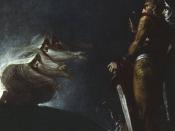The Shakespeare play 'Macbeth' is based upon a common theme, good versus evil, this is the basis of many novels, movies, songs, poems and other forms of literature. Although good versus evil in 'Macbeth' takes a more subtle form, it still generates the common outcome that 'Macbeth' shares with many other good versus evil stories. To completely understand the good versus evil theme in 'Macbeth' all of its direct outcomes must be considered, and will be considered in the following essay. To discuss good versus evil first good versus evil has to be defined and a common storyline found, the respective leaders of these groups must also be found. Considering 'Macbeth' in respect to the definition of good versus evil will make it clear that 'Macbeth' is a common good versus evil story. The three weird sisters and Hecate play a major role in this theme, they must be recognised and reflected on to help understand the role in the theme.
Finally all of the singular human clashes must be examined as they are also good versus evil (for example Macbeth versus Macduff).
Good versus evil, commonly it is known as the good team, out smarting, out muscling or generally out-doing the evil forces and winning. In 'Macbeth', as with most stories, it goes further than this. A more complicated story form is developed in Macbeth, but it goes along a similar line to this description. Often good and evil will start off as close friends, acquaintances or members of a similar group, when all of the sudden evil gains a string of thoughts that resemble evil beating good for their own personal gain. Evil makes their move and gets themselves in a strong position. Good finds themselves in a devastating position, very little hope, people not involved with the...


